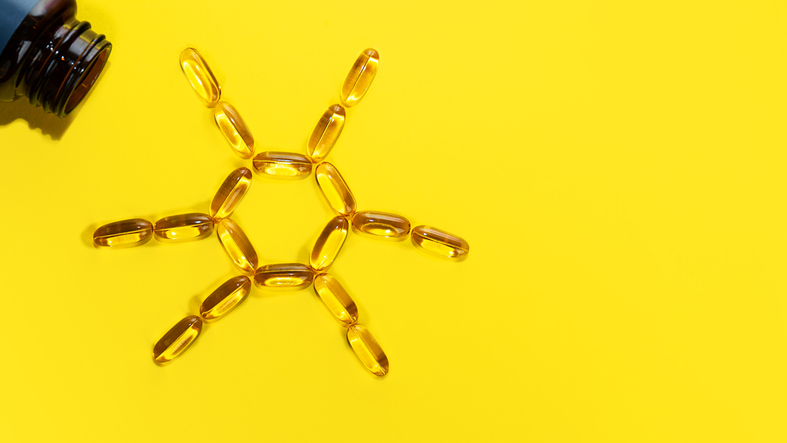Thought of Fall Got You Feeling Down? Vitamin D May Be The Answer

By Joy Stephenson-Laws, J.D., Founder
Labor Day is over, and for many this is the official end of summer (even though the first official day of fall is not until September 22). September can be an overwhelming month. People start switching to fall mode, kids are back in school and many people may already be feeling the pressure of the upcoming holiday season, also known as the “Autumn Trifecta” (Halloween, Thanksgiving and December holidays). You may be reluctant to say farewell to summer.
“I’m rarely ready for the annual transition to pumpkin spice lattes and cooler weather, but this year, the shift feels especially unwelcome — perhaps because this has been the first somewhat normal summer in more than two years, and I’m not ready for it to end,” wrote journalist and New York Times writer Melinda Wenner Moyer.
Although it is still blistering hot in Southern California where I live, I can relate to Melinda. I too am not quite ready to let summer go. I also find myself already thinking about all the obligations for the remainder of 2022.

And all at once, summer collapsed into fall." Oscar Wilde
Let’s not forget that seasonal affective disorder (SAD) is a real condition.
“It’s triggered by the change of seasons and most commonly begins in late fall. Symptoms include feelings of sadness, lack of energy, loss of interest in usual activities, oversleeping and weight gain. Treatments include light therapy, talk therapy and antidepressants,” reports the Cleveland Clinic.
I want to encourage people to get ahead of this now and prioritize their mental health. And an invaluable tool for succeeding in this appears to be vitamin D.
Also known as the “sunshine vitamin” (because we get it from the sun’s ultraviolet rays), vitamin D is a critical nutrient for bone and muscle health. There is evidence which suggests that having an adequate intake of vitamin D may help protect against acute respiratory infections.
Furthermore, a recent and extensive analysis that examined 41 previous studies found evidence suggesting that taking vitamin D supplements may help provide relief from depressive symptoms in those who have already been diagnosed with depression.
Check out these facts from the National Alliance on Mental Illness (NAMI):
- Depression and anxiety disorders cost the global economy $1 trillion in lost productivity each year.
- Depression is a leading cause of disability worldwide.
- People with depression have a 40% higher risk of developing cardiovascular and metabolic diseases [such as type 2 diabetes] than the general population. People with serious mental illness are nearly twice as likely to develop these conditions.
- 46% of people who die by suicide had a diagnosed mental health condition.
According to a recent report that discusses the analysis (that looked at more than 50,000 participants),“it's thought that vitamin D helps to regulate various functions in the central nervous system – and earlier research on animals suggests it could even contribute to the control of chemical balances in the brain, which may explain the association between vitamin D and mental health.”
Study participants included people who suffered from depression, those that did not, people who took vitamin D supplements and people who took placebos. The dose of vitamin D differed depending on the study, but the average amount was around 50 to 100 micrograms a day.
It’s really nice to know that vitamin D appears to be an effective tool in treating depression, because antidepressants may not work for everyone.

I cannot endure to waste anything so precious as autumnal sunshine by staying in the house." Nathaniel Hawthorne

According to John Hopkins Medicine, some people may feel like their antidepressant has suddenly stopped working. Symptoms return for up to 33 percent of people who are taking antidepressants, and this is breakthrough depression. Simply put, we change as humans. And our lives can change drastically (pregnancy, the loss of a loved one, new job, new diagnosis). So many factors can change the way we respond to an antidepressant. ‘
In addition to this, antidepressants may deplete the body of the nutrients we need to avoid depression in the first place. In no way am I discouraging the use of antidepressants. These are life-saving medications for many people. However, it is important to explore alternative methods with a competent healthcare professional.
Very rarely can depression and mental health disorders be fought with a singular approach. Vitamin D supplements or antidepressants are just potential tools in the tool box. Other tools in the box for treating mental health conditions may include:
- Exercise
- A nutrient-rich diet (lots of fresh fruits and veggies, very little nutrient-void, processed foods)
- Good quality sleep
- Talk therapy
- Getting outside and getting that natural vitamin D from the sun (even just a few minutes a day can help).
Of course, it is also advisable to drink alcohol in moderation (if at all) and avoid smoking.

I cannot stress enough how important it is to only supplement with the guidance of your doctor or a competent healthcare professional. Not long ago a man suffered a vitamin D overdose from improper supplement use.
By being proactive we can help prevent mental illness or better manage it if we already have it. Get ready for fall. We got this!
Enjoy your healthy life!
The pH professional health care team includes recognized experts from a variety of health care and related disciplines, including physicians, attorneys, nutritionists, nurses, and certified fitness instructors. This team also includes the members of the pH Medical Advisory Board, which constantly monitors all pH programs, products, and services. To learn more about the pH Medical Advisory Board, click here.







